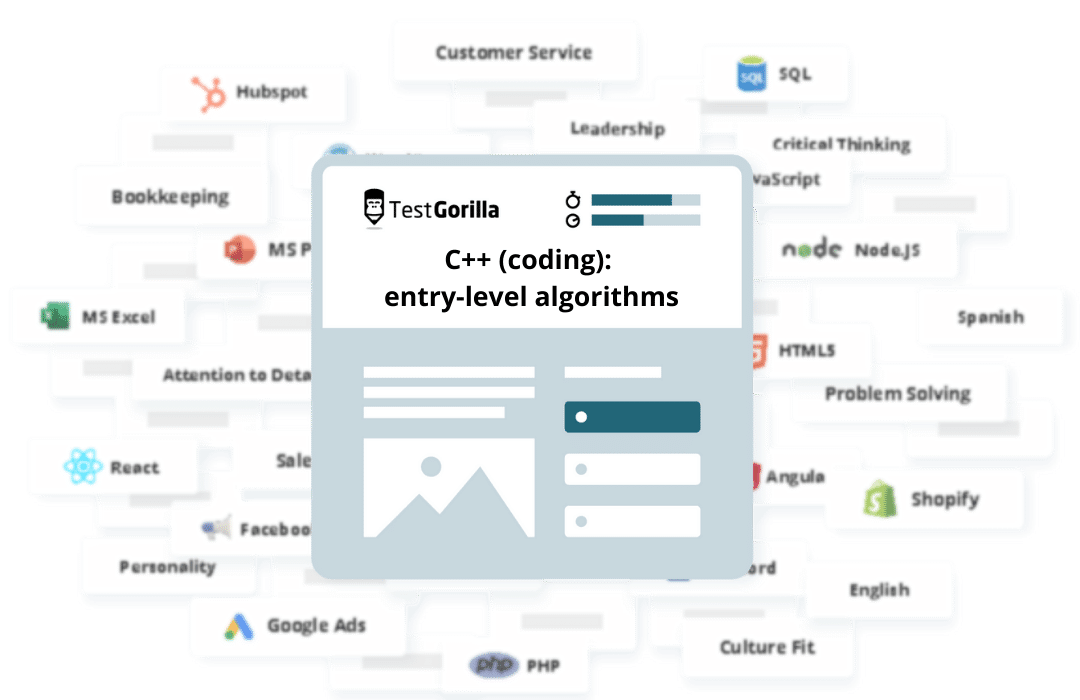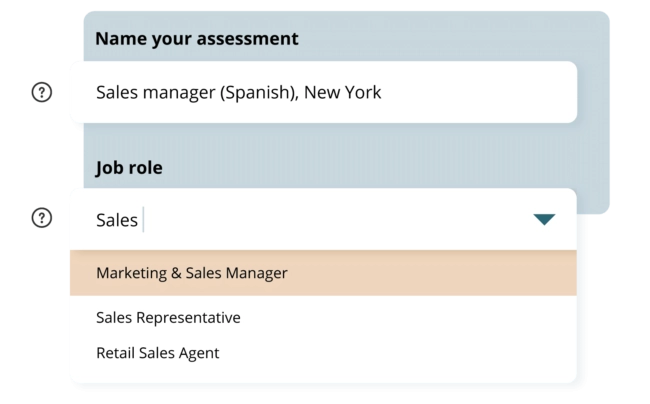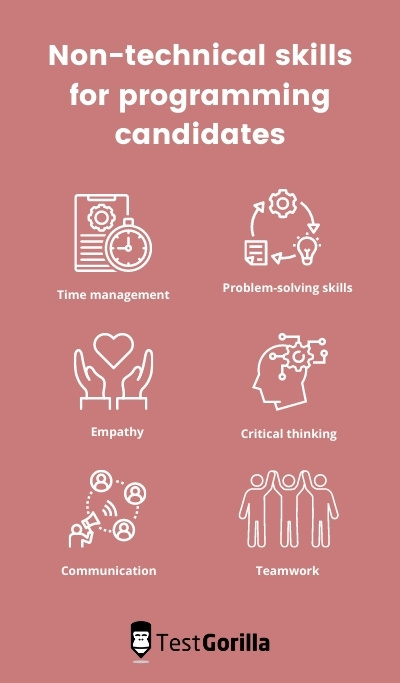C++ test online: Pre-employment screening assessment to hire the best candidates
Summary of the C++ (coding): Entry-Level Algorithms test
This coding test assesses candidates’ ability to program a small algorithm in C++, testing their basic programming skills. Using a short and straightforward coding task, this test helps you identify developers with the most essential C++ skills.
Covered skills
Entry-level algorithms
Use the C++ (coding): Entry-Level Algorithms test to hire
Entry-level developers using C++ in their technology stack.
This test is part of our Coding: Entry-Level Algorithms skills test
This C++ (coding): Entry-Level coding test forms part of our Coding: Entry-Level Algorithms test.
All entry-level coding languages are now centralized in a single, language-agnostic test to ensure hiring developers is simpler than ever. Offer your candidates a choice of 19+ entry-level coding languages in one test.
Explore the latest addition to our programming skills test library.
Type
Time
Languages
Level
About the C++ (coding): Entry-Level Algorithms test
C++ is a powerful general-purpose language created as an extension of the C programming language. C++ is great for system programming and embedded, resource-constrained software as well as large systems such as servers, performance-critical applications, video games, and desktop applications.
Strong foundational knowledge of programming in C++ is essential for junior programmers. Candidates who score well on this test can hit the ground running and set themselves up for further professional growth.
This test gives candidates 10 minutes to complete a straightforward coding task. The code is evaluated against a set of test cases, some of which are available to the candidate to determine if they are on the right track.
This is a great initial screening test that allows you to effectively screen candidates based on essential skills. We recommend combining coding tests with at least one of or cognitive ability tests evaluating numerical or analytical skills.
The test is made by a subject-matter expert
Alfred W.
Alfred is an experienced software engineer with deep expertise in Python development, data engineering, and cloud solutions architecture. He has built out a cloud native data platform for a $16B hedge fund that systematically ingested TBs/PBs of data to drive quantitative trading strategies.
Alfred is also a certified AWS Solutions Architect and DevOps Engineer at the Professional. In his free time, he enjoys reading about personal psychology and new trends in technology.
Crafted with expert knowledge
TestGorilla’s tests are created by subject matter experts. We assess potential subject-matter experts based on their knowledge, ability, and reputation. Before being published, each test is peer-reviewed by another expert, then calibrated using hundreds of test takers with relevant experience in the subject. Our feedback mechanisms and unique algorithms allow our subject-matter experts to constantly improve their tests.
What our customers are saying
TestGorilla helps me to assess engineers rapidly. Creating assessments for different positions is easy due to pre-existing templates. You can create an assessment in less than 2 minutes. The interface is intuitive and it’s easy to visualize results per assessment.
David Felipe C.
VP of Engineering, Mid-Market (51-1000 emp.)

Any tool can have functions—bells and whistles. Not every tool comes armed with staff passionate about making the user experience positive.
The TestGorilla team only offers useful insights to user challenges, they engage in conversation.
For instance, I recently asked a question about a Python test I intended to implement. Instead of receiving “oh, that test would work perfectly for your solution,” or, “at this time we’re thinking about implementing a solution that may or may not…” I received a direct and straightforward answer with additional thoughts to help shape the solution.
I hope that TestGorilla realizes the value proposition in their work is not only the platform but the type of support that’s provided.
For a bit of context—I am a diversity recruiter trying to create a platform that removes bias from the hiring process and encourages the discovery of new and unseen talent.
David B.
Chief Talent Connector, Small-Business (50 or fewer emp.)

Use TestGorilla to hire the best faster, easier and bias-free
Our screening tests identify the best candidates and make your hiring decisions faster, easier, and bias-free.
Watch what TestGorilla can do for you
Create high-quality assessments, fast
Building assessments is a breeze with TestGorilla. Get started with these simple steps.
View a sample report
The C++ (coding): Entry-Level Algorithms test will be included in a PDF report along with the other tests from your assessment. You can easily download and share this report with colleagues and candidates.
Finding the best candidates with the C++ (Coding) Entry-level Algorithms test
The C++ (Coding) Entry-level Algorithms test will help you evaluate candidates who are applying for a software developer role that requires a knowledge of the foundations of C++. The test will help you assess whether candidates know how to program a small algorithm in C++ and test their basic programming skills in that language.
With this test, you’ll be able to find candidates who have a basic understanding of C++. But before we get into the test’s details, let’s take a look at why C++ matters in today's business environment.
Why C++ is important
The programming language C++ was created as an extension to the already popular language C. C++ has many usages and it’s quite versatile. Below, you’ll see six of the best uses of C++:
• Applications: C++ is often used for app development, and especially graphical user interfaces. Most of Adobe’s applications, such as Adobe Photoshop and Adobe Illustrator, were created using C++.
• Games: The language is also used for developing video games. It lowers the complexity of many tools that are needed for game development. With C++, you significantly optimize resources and make coding 3D games more efficient and easy. Since it’s quite fast, it’s often used when developing games with game engines.
• Animation: There are many animation tools that were created in C++ such as tools used for 3D animation, modeling, rendering, or simulation. C++ is great when it comes to building real-time and image-processing tools.
• Media access: With this language, you can also create media players. One of the most famous media players, Winamp Media Player, was created in C++. With C++, you can create programs to access and listen to music, share video files, and stream audio and video content.
• Web browsers: C++ is also used for the development of web browsers. Google Chrome and Mozilla Firefox were created with C++; other Mozilla applications such as Mozilla Thunderbird also use C++, while in Chrome it’s used to reduce large cluster data processing.
• Other uses: C++ is a versatile programming language. It’s used in medical applications such as programs for MRI scans and also in engineering applications such as CAM systems.
As you can see, this programming language has a lot of different business uses and functions. For that reason, if you need to hire someone with a solid grasp of the basics of C++, it’s essential to test their skills. The best way to do that is by using a pre-employment C++ programming test in your hiring process.
How can the C++ (Coding) Entry-level Algorithms test help recruiters?
If you need to hire a software developer with a solid knowledge of the fundamentals of C++, the best way to test their skills is by using a pre-employment assessment featuring a C++ programming test.
Pre-employment assessments have many benefits, but the following three are the most important ones:
Tests guarantee a bias-free hiring process
When hiring, you shouldn’t rely on CV screening alone – or at all. CV screening is a very inaccurate way to select applicants because it opens the door to unconscious hiring biases and you have no way of knowing whether the information you see in candidates’ CVs is true.
This results in false positives and false negatives – you risk inviting to interview candidates who simply don’t have the right skills, or disqualifying some applicants who would be an excellent match for the open position.
Using a pre-employment test like the C++ (Coding) Entry-level Algorithms test helps you address these challenges, because it evaluates applicants’ skills accurately, leaving no place for bias. You simply need to send it to all applicants and wait for the results. This way, all candidates will be scored solely on the basis of their skills, which enables you to eliminate bias from the hiring process.
Scoring is automatic and objective
When you give your candidates a pre-employment assessment, they will all take the same tests with the same questions and all results you will receive will be automatically calculated. You’ll be able to see candidates’ scores so you will easily know how each candidate performed.
Then, you can compare the candidates' scores to see who did best: The higher the score, the more skilled your candidate is. Test scores are an accurate indicator of candidates’ expertise and knowledge, making it easy for you to identify the best talent. Then, you simply need to invite the applicants who scored well on your assessment to the next stage of your recruitment process.
Assessments are very simple to use
Pre-employment assessments are incredibly easy to use. Hiring managers simply need to select the right tests for the assessment (corresponding to the skills they want to evaluate) and then send it with a single click to all candidates. It makes no difference if there are 20, 50, or 200 candidates: TestGorilla is infinitely scalable and adapts to your hiring needs and the number of candidates you need to assess. Using a pre-employment assessment to test candidates’ coding skills in C++ is a very simple and scalable solution.
What does this C++ programming test cover?
The C++ programming test uses a short and straightforward coding task to assess candidates’ knowledge of entry-level algorithms, such as:
• Sorting• Searching• Reverse• Min element• Max element
The test only evaluates candidates’ basic knowledge of C++, making it suitable for junior roles where only fundamental C++ skills are needed. It provides the candidate with 10 minutes to finish a simple task in C++. After the time is over, the code that the candidate wrote is evaluated against a set of test cases to see if it’s working as intended.
In summary
When you’re looking to hire a candidate who has a solid knowledge of the basics of C++, it’s essential to accurately assess their skills to make sure they’re qualified for the role.
The best way to do this is to use a C++ (Coding) Entry-level Algorithms test during recruitment. The test provides objective results, helps you minimize hiring bias, and is really easy to implement in your hiring process. Finding the right candidate has never been easier!











